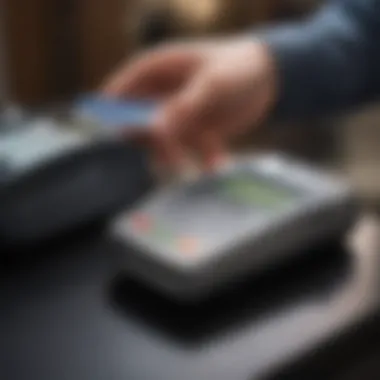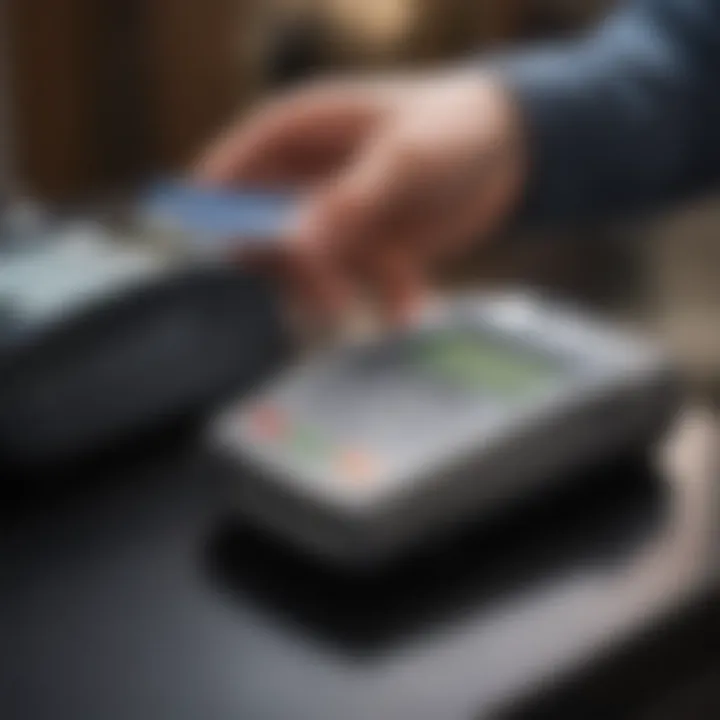Using Debit Cards for Money Orders: An Insightful Guide


Intro
In today’s fast-paced world, managing money and understanding various payment methods is crucial. One area that often flies under the radar is the acquisition of money orders utilizing debit cards. This approach can simplify transactions for many individuals, but it also carries specific considerations that must be understood.
When young professionals, students, and small business owners are looking for ways to handle their finances efficiently, getting acquainted with the nuances of payment methods, like debit cards, is essential. This article aims to provide a comprehensive guide on how to use debit cards for money orders. It will explore the benefits, drawbacks, and procedural steps involved, ensuring that readers have all the necessary information at their disposal.
As you explore these methods, be assured that knowledge is power in managing your financial life. From understanding financial literacy to implementing effective budgeting, we will cover significant aspects to enhance your ability to navigate these increasingly complex financial landscapes.
Understanding Financial Literacy
Definition and Importance
Financial literacy refers to the understanding of various financial skills and concepts. This includes budgeting, investing, borrowing, and managing debt. In simpler terms, it’s about knowing how to make informed choices about money. Possessing a solid grounding in financial literacy is instrumental for anyone looking to achieve financial stability and independence.
The importance stems from the shift in our economy towards digital transactions and online banking. With such changes, having reliable knowledge about finance can prevent costly mistakes and help individuals seize opportunities when they arise.
Basics of Financial Literacy
Here’s a brief look at the basics of financial literacy, which are essential for handling transactions like money orders efficiently:
- Understanding Interest Rates: Knowing how interest accrues on loans can help avoid unmanageable debts.
- Creating a Budget: Planning your finances effectively helps track spending and savings.
- Managing Credit: Comprehending credit reports and scores allows for better borrowing decisions.
These foundational skills set the stage for more complex understanding later on, especially when investing in ways to secure financial futures.
Importance of Budgeting
Overview of Budgeting
Budgeting is crucial for keeping financial goals aligned with actual spending. At its core, it is about creating a plan for your money. This ensures that essential expenses are met while allowing for discretionary spending. It helps young professionals and students alike to navigate their financial responsibilities effectively.
Benefits of Having a Budget
Here are several benefits to having a budget that particularly resonate with young professionals and small business owners:
- Awareness of Financial Standing: Regularly reviewing a budget fosters a clear sense of where money is going.
- Goal Setting: It helps allocate funds towards short-term and long-term financial goals.
- Stress Reduction: A workable budget can alleviate the worries associated with unexpected expenses.
In essence, combining financial literacy with effective budgeting paves the way for wiser decisions, especially when choosing payment methods like debit cards for obtaining money orders.
"Knowledge is like a garden: if it is not cultivated, it cannot be harvested."
By understanding these fundamental concepts, readers will draw closer to executing financial transactions more confidently, including utilizing debit cards for money orders. Buckle up, as we venture into the practical implications and procedures next.
Prelude to Money Orders
In today’s fast-paced financial landscape, the use of money orders is gaining traction. Understanding the concept of money orders becomes crucial when exploring their acquisition through debit cards. Money orders serve as a reliable alternative to cash or checks, especially for individuals who seek a secure way to send or receive funds without the need for a bank account. Reading further will unveil why money orders can be particularly appealing, especially to younger professionals or small business owners who may be navigating their financial responsibilities with limited resources.
Definition and Purpose
A money order is essentially a payment order for a pre-specified amount of money. It’s a form of payment that is generally purchased using cash, a debit card, or a credit card. Unlike personal checks, which carry the risk of bouncing without sufficient funds, money orders are prepaid, ensuring that the money is available before it changes hands. This makes them a favored option for transactions where reliability and security are paramount. It’s also worth noting that money orders can be cashed or deposited at various financial institutions, making them versatile for both sender and receiver.
Comparison with Other Payment Methods
When considering money orders, it's important to compare them with other payment methods available. Each has its unique characteristics that contribute to the decision-making process depending on the context of the payment.
Checks
Checks are one of the traditional methods that stand alongside money orders. Unlike money orders, checks can be written for any amount and signed off by the payer. The key characteristic of checks is that they can be easily returned if there are insufficient funds, which can lead to complications. However, checks are popular because they enable personal transactions, allowing for a degree of flexibility not found with money orders. Their unique feature lies in the convenience of writing them for varying amounts, but this can also be their downfall due to the risk of bounced payments, which is a disadvantage from a reliability standpoint in the context explored in this article.
Cash
Cash remains king in simple payments and can be used directly in transactions like money orders. The defining aspect of cash is its immediacy; once you have it, you can use it anywhere that accepts physical currency. While cash is widely accepted, the downside is that it can be risky to carry large amounts around. You might lose it, or worse, it can be stolen. For money orders, cash contributes to the straightforwardness of acquiring them but limits options for some individuals who may prefer to use electronic means instead.
Electronic Transfers


Electronic transfers, such as wire transfers or services like PayPal, have revolutionized payments. The primary characteristic of electronic transfers is their speed, allowing funds to move from one account to another nearly instantaneously. They simplify payments in a digitalized world but might not always be the best fit for all transactions, particularly when dealing with individuals or businesses that prefer more traditional payment methods. The unique feature of electronic transfers lies in their ability to facilitate seamless transactions across great distances but can incur additional fees, which may detract from their overall value.
In summary, understanding money orders in the lens of other payment methods highlights their utility and validity, especially when considering factors such as payment security, reliability, and the unique challenges presented by checks, cash, and electronic transfers. This comparative approach is critical for young professionals, students, and small business owners who need practical solutions for everyday monetary transactions.
Understanding Debit Cards
When discussing the acquisition of money orders, it's crucial to grasp the essence of debit cards. They play a significant role in facilitating these transactions. Debit cards represent a direct connection to your bank account, allowing weighted decisions about finances while providing a buffer against racking up debt. Young professionals and small business owners particularly benefit from understanding how these cards function, as they often seek efficient and secure methods of catering to their financial needs.
What Is a Debit Card?
A debit card is a plastic card issued by banks, linked directly to a checking account. Instead of borrowing money like with credit cards, when you use a debit card, you use your own funds. Think of it as an extension of your checking account; when you swipe it, the money is deducted instantly, keeping your spending in check.
Often, debit cards come with a Visa or MasterCard logo, enabling them to be used in a variety of locations, such as grocery stores, online marketplaces, or even for money orders at specialized locations. This versatility makes debit cards a popular choice among users who want to manage their funds effectively and avoid overspending.
Using a debit card also offers functional features, such as the ability to withdraw cash from ATMs, and in some cases, earn rewards similar to credit cards. This can be a convenient option for frequent transactions, making it crucial for readers to understand these basic aspects before engaging in money order purchases.
How Debit Cards Work
In essence, debit cards function as electronic checks. They work by linking to your bank account, providing a seamless method to make purchases without the hassle of carrying cash or checks. Here’s a closer look:
- Transaction Process:
- Verification:
- Potential Holds:
- Fees and Charges:
- When you make a purchase, the merchant’s terminal processes your debit card.
- You’ll need to enter your Personal Identification Number (PIN) to authorize the payment securely.
- Funds are then directly withdrawn from your checking account.
- The bank verifies if you have sufficient funds to cover the transaction.
- If funds are available and the transaction is authorized, the payment goes through without delay.
- Sometimes, merchants may place a hold on your account for authorizations, especially in cases of gas stations or hotel bookings, which can temporarily reduce your available balance.
- It’s also important to keep an eye on potential fees, like ATM costs or monthly service charges that some banks impose. These can add up and affect your overall budget, so knowing what to expect is key.
Understanding how debit cards operate lays a strong foundation for using them efficiently for money orders, ensuring that transactions are smooth and manageable. Keeping your financial health in sight is all about thoughtful selections regarding payment methods.
Acquiring Money Orders with Debit Cards
Understanding how to obtain money orders using debit cards is crucial in managing finances effectively. This method offers a desirable blend of convenience and instant access to funds, making it ideal for young professionals, students, and small business owners. With the ease of using a debit card, individuals can navigate the sometimes complicated waters of money orders without the usual hassles associated with checks or cash transactions. In essence, acquiring money orders with debit cards elevates the payment experience, saving time and reducing the risks associated with carrying cash.
Step-by-Step Procedure
Getting your money order with a debit card can feel a bit like following a recipe. Each step has its distinct flavor and importance. Here’s the breakdown:
Identifying Approved Locations
One of the first tasks on your list is to find the right spot to purchase the money order. Identifying approved locations is essential because not every place will accept debit cards for this service. Banks, credit unions, and certain grocery stores often provide this option. The main characteristic here is accessibility; having a variety of locations that accept debit cards enhances user experience and simplifies the process.
Moreover, many folks lean towards these locations since they realize that they’re well-informed and equipped to handle any discrepancies. The unique feature of these venues is their availability at multiple points in urban areas, making it a popular choice for people on the move. The downside? Some places might impose their rules, and questioning the acceptance of debit cards can yield different answers depending on timing or the staff's understanding.
Providing Necessary Information
Once you've found your location, the next crucial step is providing necessary information. Typically, this involves giving your debit card details and confirming your identity, which helps protect against fraud and ensures everything's on the up-and-up. This step is majorly significant as it eliminates potential hiccups down the road, especially when the order's value is considerably high.
Notably, the security aspect of providing information is designed not only to safeguard your funds but also to fulfill legal requirements. While most transactions are standard and quick, the speed can vary depending on how organized the location is. The upside here is that if everything checks out, you're likely looking at a locked-in transaction without too much back-and-forth.
Completing the Payment
Finally, completing the payment is the cherry on the sundae. This step confirms the transaction and sets the wheels in motion. A vital characteristic of this process is that the payment often goes through right then and there, contrasting with checks which may take days to clear.
The unique takeaway from this step is its immediacy—once you hand over your debit card and receive the receipt, you can breathe easy knowing the money order is in your hands. The appeal of this is strong, especially for individuals who appreciate instant results. However, an eye should be kept on the transaction limits your bank may enforce, as exceeding these could lead to bounced payments.
Fees and Charges
As you've dug into acquiring a money order with a debit card, it's key to pay attention to associated fees and charges. These costs can sneak up on you if you’re not careful.
Typical Fees Incurred
Using a debit card for money orders often comes with a standard fee, which can usually range from a couple of dollars to more based on the institution. The typical fees incurred are typically small but vary between locations. A major detail to keep in mind is that, despite sounding trivial, these fees can pile up if you're making multiple transactions in a short span.


The simplicity of knowing what your transaction will cost upfront is beneficial, allowing you to budget easily. The disadvantage, however, could be that certain outlets might not be transparent about their fee structure, leading to a nasty surprise post-transaction.
Potential Hidden Costs
A wise individual, always wary of the fine print, knows about potential hidden costs that could pop up, even when seemingly smooth sailing. This aspect contributes significantly to understanding the overall expenditure involved. Charges like service fees, for instance, might not be immediately obvious.
It’s vital to inquire prudently about these hidden charges at your chosen location. Many users report unexpected costs, particularly if they involve larger transactions, or if additional paperwork or services come into play. This unique feature ties back to needing awareness, making it worth every moment spent asking questions.
Navigating the terrain of acquiring money orders with debit cards is an enlightening experience, revealing both the ease of access and the need for thorough understanding of associated costs.
Benefits of Using Debit Cards for Money Orders
When it comes to handling financial transactions, folks are always on the lookout for methods that can simplify their lives. Using debit cards for money orders offers several advantages that make this approach appealing, especially for those who like to keep things straightforward. Let's break down the significant benefits one by one.
Convenience and Accessibility
In today’s fast-paced world, convenience is king. Using a debit card to buy a money order is often more accessible than standing in line at a bank or post office for cash. Many retailers and convenience stores accept debit card transactions for money orders, which means you can grab one while you’re out running other errands.
- Quick Access: No need to withdraw cash from an ATM, which can sometimes be a hassle depending on fees. Just swipe and go!
- Familiar Process: Most people are accustomed to using debit cards – that familiarity can reduce anxiety around financial transactions.
- Industry Reach: From Walmart to CVS, several well-placed outlets allow for easy transactions, making it as simple as finding a local convenience store.
For someone who’s juggling work, school, or a small business, this kind of accessibility can save both time and mental energy.
Immediate Transactions
Another major perk of using debit cards for money orders is the immediacy of the transactions. When you make a payment with a debit card, the funds are often withdrawn right away, which helps keep your financial records clear and manageable.
- No Waiting Period: Unlike checks that can take days to clear, money orders paid with a debit card give you instant confirmation, ensuring that the payment has gone through.
- Real-Time Balance Updates: Many banking apps notify you after every transaction, so you know exactly what's left in your account immediately.
- Straightforward Tracking: Having digital records can make it easier to reconcile your statements. You can simply pull up your app to verify transactions rather than tracking cash payments.
This immediacy can be crucial when timing is everything, such as in small business transactions.
Account Control
Using debit cards for money orders also enhances personal financial control. This is especially pertinent for young professionals or small business owners who need to stick to budgets. With a debit card, you spend only what you have, eliminating the temptation to overspend.
- Budget-Friendly: Every transaction gets deducted directly from your checking account, making it unmistakably clear where your money goes.
- Avoid Debt Risks: Unlike credit cards, there’s no risk of falling into debt with purchases made through a debit card. You can only spend up to what’s in your account, which promotes better financial habits.
- Track Spending Easier: Most banks offer monthly statements or apps that summarize spending by category. This gives you the insights needed to track and adjust your habits accordingly.
Ultimately, it’s about making money management a tad easier, especially for those who are still navigating financial independence.
In summary: Debit cards not only ease the process of acquiring money orders but also foster better spending practices, quick transactions, and hassle-free access to your funds. These elements are particularly beneficial for young professionals and small business owners who often seek elegant and straightforward solutions to their financial transactions.
Drawbacks and Limitations
Understanding the drawbacks and limitations of using debit cards for money orders is crucial for anyone considering this payment method. While debit cards can offer convenience, they also come with potential pitfalls that can affect your financial safety and transaction experience. In a world where informative decision-making is vital, being aware of these limitations ensures you are better prepared when managing your finances.
Potential Fraud Risks
Fraud risks associated with debit cards cannot be understated. Given that money orders are often used for transactions where the sender does not have the luxury of a refund, the urgency to load funds onto a debit card or obtain a money order can leave users vulnerable to scams.
When a person falls victim to fraud, the repercussions can be devastating. For instance, if someone uses a compromised debit card to purchase a money order, their personal banking information might be at risk. This can lead to unauthorized withdrawals or lingering consequences, like incorrectly managing one’s account due to a temporary freeze while the bank resolves the issue. Always ensure to use secure networks and scrutinize the circumstances surrounding any transaction.
Another point to consider is how some money orders can be used anonymously. If fraudsters can acquire one through your debit card, they can disappear into thin air, leaving you without recourse. Be vigilant; if a deal seems too good to be true, it often is.
Withdrawal Limits
When handling debit cards for money orders, users may run into withdrawal limits imposed by banks. Each financial institution typically has preset regulations governing how much money you can withdraw in a single day or within a week. This can be particularly restrictive when trying to acquire a money order that exceeds these limits.
For example, suppose you need to send a large sum of money urgently but realize that your debit card only allows a certain withdrawal amount. This situation could compel you to either wait several days until you can withdraw the full amount or to seek alternatives, which can lead to unnecessary delays. As any seasoned professional would advise, being aware of these limits can save you from a headache later.
Not Universally Accepted
Despite their prevalence, debit cards are not universally accepted for money orders. Some locations may only accept cash or checks, putting a damper on your plans if you’re relying on your debit card. In some cases, this can even result in extra trips or additional fees due to the need for alternative payment methods.
Take a second to consider this: If you planned on using your debit card and find out the store only takes cash, you may lose time and potentially money, especially if you're in a rush. Therefore, before heading out, it might be beneficial to call ahead or check the policies of the store where you intend to purchase a money order. Make informed decisions as best as you can!


A little precaution goes a long way; always verify payment options before pleading your case at the counter.
Alternative Payment Methods
In the realm of managing financial transactions, exploring alternative payment methods offers valuable insights. Each method comes with its own set of benefits and considerations, delivering flexibility to those who seek it. For younger professionals, students, and small business owners, understanding these methods can be pivotal in navigating the financial landscape effectively. It's essential to evaluate how these alternatives can complement using debit cards for money orders and enhance overall financial management.
Cash
Cash is perhaps the most straightforward and time-tested method of payment. When it comes to money orders, cash can be advantageous since it does not involve the risk of overdrafts or hidden fees, which may be tied to debit card transactions. The immediacy of using cash also means that there is no waiting period for fund availability. For individuals who prefer a tangible, hands-on approach to their finances, cash simplifies the process, enabling them to transact directly without relying on electronic processing.
However, the downside of cash is evident in safety and security issues. Carrying large amounts of cash can invite theft, and unlike electronic transactions, cash does not leave a paper trail, making record-keeping more challenging. In addition, many businesses prefer electronic payments for ease of accounting. Therefore, while cash is a viable option, it’s imperative to weigh its limitations against the convenience of digital methods.
Credit Cards
Credit cards bring a different flavor to financial transactions. They offer a level of convenience that cash and debit cards can't always match. When purchasing money orders, credit cards can provide the opportunity to earn rewards or cash back, especially if the transaction amount is significant. Additionally, credit cards often come with additional buyer protection and fraud detection services, which can safeguard the user against potential issues.
However, caution is paramount. One of the biggest pitfalls of credit card use is accruing debt. Users must be diligent in paying off the balance each month to avoid high-interest charges. Furthermore, not all retailers that process money orders accept credit cards, so it’s wise to confirm before heading out.
Electronic Payment Apps
The rise of electronic payment apps like Venmo and PayPal reflects a shift towards the digital economy. These platforms offer unmatched convenience; transferring funds becomes as easy as a couple of taps on your smartphone. When incorporating them into money order transactions, they can serve as an intermediary, simplifying the process of purchasing a money order by allowing users to fund their purchase directly from their bank account or linked debit card.
Moreover, many electronic payment applications provide user-friendly interfaces and often come with real-time notifications, keeping track of transactions in a way that cash never could. However, understanding the fees tied to these platforms is crucial. While they present a modern solution, users should remain mindful of the terms, as some apps might charge for transferring money instantly or other seemingly casual transactions.
Best Practices for Financial Transactions
Navigating the waters of financial transactions, particularly when it comes to money orders and debit card usage, requires a careful touch. Embracing best practices isn’t just about safeguarding your funds; it’s also about enhancing your overall financial literacy and ensuring that you make sound choices that benefit your wallet and well-being.
Assessing Your Needs
Before diving into payment methods, it’s crucial to take a moment to evaluate your financial requirements. Think about why you need a money order. Are you sending funds to a family member who doesn’t have a bank account? Or perhaps you’re paying a bill that only accepts money orders?
Understanding the purpose will not only clarify your choice of transaction method but also guide you towards the right amount. Take a few moments to:
- Identify your objectives: Ask yourself what you’re trying to achieve with this transaction.
- Calculate the amount needed: Ensure you don’t send too little or too much, leading to unnecessary fees or delays.
- Consider timing: Different transactions have varying processing times, which may impact your decision.
By consciously thinking about your needs, you set the stage for a smoother transaction and avoid any potential pitfalls along the way.
Maintaining Records
Keeping track of your transactions is another fundamental practice that can’t be overlooked. For many, the idea of maintaining records might sound tedious or unnecessary, but consider this: it can save you from headaches down the line. Here’s why it’s both beneficial and essential:
- Transparency: A good record provides a clear overview of your financial habits, helping to pinpoint trends, such as habitual overspending.
- Evidential support: Should any transaction disputes arise, having comprehensive records gives you solid backing.
- Tax preparation: If you’re running a small business, accurately keeping track of payments could simplify tax preparation.
To maintain robust records:
- Use spreadsheets or financial apps to track your expenses and payments.
- Keep receipts for your money orders until you’re sure the transaction went through without a hitch.
- Create a dedicated folder, either physical or digital, where all transaction documents go.
Choosing the Right Payment Method
It’s a common scenario—standing in line, wallet in hand, assessing which payment option would be the most effective. Choosing the right payment method isn't a one-size-fits-all approach. Several factors come into play:
- Fees: Different methods may incur various costs. Debit cards generally have lower fees compared to credit cards, but it’s essential to check the specifics with your bank.
- Acceptance: Some places may not accept certain forms of payment. Make sure you know what’s on the table to avoid embarrassing situations.
- Speed: How fast do you need the funds to get to their destination? While debit cards can offer immediate transactions, some methods may take longer to process.
"By adhering to these best practices, you empower yourself in financial dealings, ensuring time and money are well spent."
Ultimately, integrating these practices into your approach can provide long-lasting benefits, setting a foundation for fruitful financial transactions for years to come.
Ending
In the rapidly evolving landscape of financial transactions, understanding how to effectively use debit cards for money orders plays a crucial role. This article illuminates the intricate procedures, benefits, and potential hurdles associated with this method of payment. The key takeaway is that integrating debit cards into your money order transactions not only offers convenience but also ensures immediate access to your funds, allowing for better financial control.
Summary of Key Points
- Procedure Overview: The process of acquiring money orders via debit cards is straightforward. It begins with identifying approved locations that allow this payment method, then providing necessary information, and completing payments at the terminal. Familiarizing oneself with each step can mitigate confusion and streamline transactions.
- Financial Benefits: Utilizing debit cards for money orders makes managing personal finances easier. Not only do users avoid the burdensome task of carrying cash, but this method also helps avoid the risk of bounced checks commonly associated with writing paper checks.
- Risks to Consider: While there are attractive benefits, potential fraud risks cannot be overlooked. Users must be vigilant regarding the security of their debit card information, as unauthorized transactions can lead to significant financial consequences.
- Alternatives: Though debit cards provide numerous advantages, they are not universally accepted. Exploring alternative payment methods such as cash, credit cards, or electronic payment applications may offer flexibility in certain transactions.
Final Considerations
As you contemplate utilizing debit cards for your monetary needs, it’s essential to weigh the offered benefits against the potential drawbacks. Evaluate your financial habits and needs to determine the most fitting method for your transactions. Aim to maintain clear records of all transactions, which can facilitate better budgeting and tracking of expenses over time. Lastly, in an age where financial literacy is pivotal, remaining informed about different payment methods empowers you to make savvy decisions to enhance your financial proficiency.
In summary, the knowledge gained from this article is not just about using debit cards for money orders; it extends into the broader realm of managing personal finances effectively in a world that increasingly favors digital transactions. Stay attentive, be proactive, and make informed choices to navigate your financial journey successfully.



